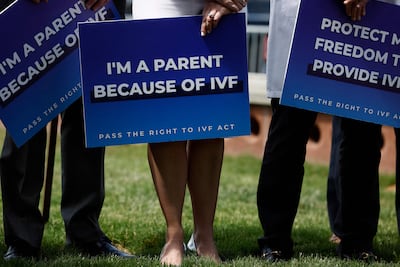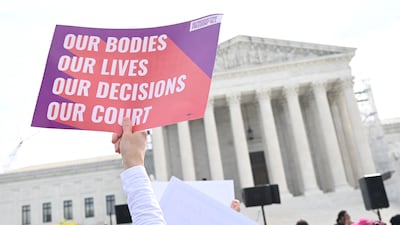The confused state of US reproductive rights was highlighted this week after Republicans blocked a bill to protect in vitro fertilisation (IVF), while the Supreme Court upheld protections for a pill used in most abortions – at least for now.
Reproductive rights have taken centre stage in the run-up to the November 5 presidential election, with Republicans on the defensive two years after the conservative Supreme Court ended the national right to abortion, leading to a series of state-level bans and restrictions.
The politically and culturally influential Southern Baptist convention voted on Wednesday to officially oppose IVF, a widely used infertility treatment that has helped millions of people become parents.
About 2 per cent of babies born in the US are conceived with the help of IVF, but critics oppose it because some excess frozen embryos are discarded in the process.
The Southern Baptists are seen as a bellwether for ultraconservative or evangelical thinking in the US and hold large sway in the Republican Party, so official opposition to IVF could presage legislative moves to ban IVF.
Senate Republicans almost unanimously blocked a Democratic bill on Thursday to protect IVF access after state-level moves to crackdown on the practice.
The bill's lead sponsor, Tammy Duckworth, a Democratic senator who used IVF, condemned Republicans.
“As a mum who struggled with infertility for years, as a parent who needed IVF to have my two beautiful little girls all I can say to my Republican colleagues in this moment is: How dare you,” Ms Duckworth told reporters.
US President Joe Biden said Republican “disregard for a woman’s right to make these decisions for herself and her family is outrageous and unacceptable”.

Donald Trump said in February that he would “strongly support the availability of IVF” and called on lawmakers in Alabama to preserve access to the treatment after the state's Supreme Court in February ruled that three couples who had lost frozen embryos during an accident at a storage facility could sue the fertility clinic and hospital for the wrongful death of a minor.
Even far-right conservatives like Ted Cruz, who voted against the Democratic bill this week, have introduced their own legislation on IVF and played down Democratic accusations that the party is trying to ban it.
“No one is trying to ban IVF. Not one senator. I voted against this legislation because it goes far beyond IVF. It is designed to be a backdoor to federalise abortion and other issues,” Mr Cruz said in a statement.
Abortion pill
Within hours of the Senate vote on IVF, the conservative-led Supreme Court unanimously blocked challenges to federal approval of the drug mifepristone, which is used in 60 per cent of abortions.
It was a rare and unanimous victory for abortion access from the court, which in 2022 overturned Roe v Wade, the 1973 decision that recognised the federal right to abortion.
Mifepristone is a drug that blocks the hormone progesterone that is needed for a pregnancy to continue. With another medicine called misoprostol, the pill is used to end a pregnancy up to 10 weeks' gestation (70 days or less since the first day of the last menstrual period).

Conservative Justice Brett Kavanaugh, appointed to the court by Trump, noted in the court's opinion that the anti-abortion doctors who brought the case do not prescribe the drug in their own practice.
“Rather, the plaintiffs want FDA to make mifepristone more difficult for other doctors to prescribe and for pregnant women to obtain,” Mr Kavanaugh wrote.
Under the US Constitution, a group’s “desire to make a drug less available for others does not establish standing to sue,” he added.
Democrats, though, say it is not a sign to relax in the fight to regain federal protections for abortion and the court wrote that the issue may “be left to the political or democratic processes”, hinting at the possibility of future legislative attempts to ban the abortion pill.
After the overturn of Roe v Wade, access to the procedure in 26 states and three territories is “at risk of being severely limited or prohibited”, according to the Centre for Reproductive Rights.
“Almost half the states are likely to enact new laws as restrictive as possible or seek to enforce current, unconstitutional laws prohibiting abortion,” says the centre.


